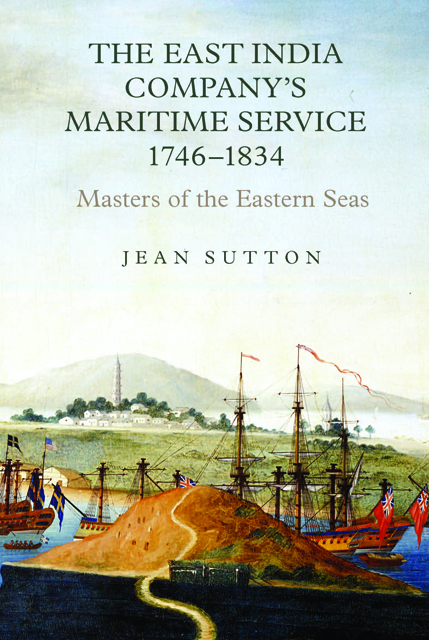Book contents
- Frontmatter
- Contents
- List of Illustrations: plates and maps
- Dedication
- Preface
- Larkins Family Tree
- Introduction
- Part I In the Company’s Service
- Part II William Larkins, Commander and Managing Owner
- Part III Thomas Larkins, Commander and Managing Owner
- Part IV John Pascall Larkins, Esq., Managing Owner
- Part V The New World Disorder
- Conclusion
- Appendix I
- Appendix II
- Bibliography
- Glossary
- Index
9 - Diversifying: Brahmins and Convicts
Published online by Cambridge University Press: 18 February 2023
- Frontmatter
- Contents
- List of Illustrations: plates and maps
- Dedication
- Preface
- Larkins Family Tree
- Introduction
- Part I In the Company’s Service
- Part II William Larkins, Commander and Managing Owner
- Part III Thomas Larkins, Commander and Managing Owner
- Part IV John Pascall Larkins, Esq., Managing Owner
- Part V The New World Disorder
- Conclusion
- Appendix I
- Appendix II
- Bibliography
- Glossary
- Index
Summary
JOHN ARRIVED back in Blackheath to find Thomas already a seasoned managing owner of three ships. He had taken over the family business from his mother, Christian, and was building on his father's foundations. With the completion of a voyage to China Dover had handsomely repaid the outlay on her refitting. Thomas now sold her to government contractors Camden, Calvert & King for use as a transport and bought Royal Admiral from Sir Richard Hotham, who was withdrawing from ship ownership. She had completed her four voyages but Thomas hoped to hire her to the company for a fifth and employ her profitably in other ways. Warren Hastings was stationed for Bengal and Madras for the season 1789/90. John's previous voyage had not been profitable and as he began to get his private trade investment together conditions were discouraging. The Society of East India Commanders wrote to the Court about this time expressing concern at their poor prospects. They were not complaining about the privilege itself, which at £7000 to £8000 had produced good returns till now. The problem was that the markets were flooded with goods brought in by foreign ships, often equal in number to those taken up by the Company. Many of these were officered and commanded by Britons, often ex-Company. The native merchants negotiated with them for prohibited goods, too. In 1788 David Scott had been elected as a director of the Company. As part of his campaign to fight monopoly from within its stronghold he had harangued his fellow directors and written pamphlets demonstrating the stupidity of the commanders being forced to smuggle out British manufactures which were not competing with Company exports. He had succeeded in getting a relaxation of the rules, so that the commanders and officers could fill up any spare capacity in the hold freight free. John took advantage of this development, applying to the Court to ship goods in addition to his privilege and promising to deposit the proceeds in the Company's treasury in Bengal. Most of the commanders bought the privilege of their junior officers and craftsmen. Commanders with no money to invest could always sell their privilege to the London agents of the Indian Houses of Agency.
- Type
- Chapter
- Information
- The East India Company's Maritime Service, 1746-1834Masters of the Eastern Seas, pp. 171 - 186Publisher: Boydell & BrewerPrint publication year: 2010

